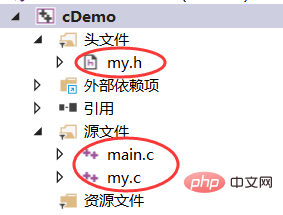 Backend Development
Backend Development
 C#.Net Tutorial
C#.Net Tutorial
 What are the command keywords contained in files in C language?
What are the command keywords contained in files in C language?
What are the command keywords contained in files in C language?
The keyword of the file inclusion command is "include". The file inclusion command "#include" is a commonly used preprocessing command in C language programs. It is used to introduce the corresponding header file (".h" file), and its format is "#include "Header.h"".

The operating environment of this tutorial: windows7 system, c99 version, Dell G3 computer.
#include is called the file inclusion command , which is used to introduce the corresponding header file (.h file). #include is also a type of C language preprocessing command. The processing process of
#include is very simple, which is to insert the contents of the header file into the location of the command, thereby connecting the header file and the current source file into one source file, which is the same as copying Pasting has the same effect. There are two ways to use
#include, as follows:
#include <stdHeader.h> #include "myHeader.h"
Use angle brackets < > and double quotes " "The difference between is that the search path for the header file is different:
Use angle brackets
< >, the compiler will search for the header in the system path File;When using double quotes
" ", the compiler first searches for the header file in the current directory. If not found, it then searches for it in the system path.
In other words, using double quotes provides one more search path than using angle brackets, and its function is more powerful.
We have been using angle brackets to introduce standard header files, now we can also use double quotes, as shown below:
#include "stdio.h" #include "stdlib.h"
stdio.h and stdlib.h are both standard header files , they are stored in the system path, so they can be successfully introduced using angle brackets and double quotes; and the header files we write ourselves are generally stored in the path of the current project, so angle brackets cannot be used and only double quotes can be used.
Of course, you can also add the directory where the current project is located to the system path, so that you can use angle brackets, but generally no one does this, it is purely unnecessary and thankless.
Notes on #include usage:
A
#includecommand can only contain one header file, multiple header files require multiple # include command.The same header file can be introduced multiple times. The effect of multiple introductions is the same as the effect of one introduction, because the header file has a mechanism at the code level to prevent repeated introduction.
File inclusion allows nesting, which means that another file can be included in an included file.
Example:

//计算从m加到n的和
int sum(int m, int n) {
int i, sum = 0;
for (i = m; i <= n; i++) {
sum += i;
}
return sum;
}//声明函数 int sum(int m, int n);
#include <stdio.h>
#include "my.h"
int main() {
printf("%d\n", sum(1, 100));
return 0;
}C Language Video Tutorial"
The above is the detailed content of What are the command keywords contained in files in C language?. For more information, please follow other related articles on the PHP Chinese website!

Hot AI Tools

Undresser.AI Undress
AI-powered app for creating realistic nude photos

AI Clothes Remover
Online AI tool for removing clothes from photos.

Undress AI Tool
Undress images for free

Clothoff.io
AI clothes remover

AI Hentai Generator
Generate AI Hentai for free.

Hot Article

Hot Tools

Notepad++7.3.1
Easy-to-use and free code editor

SublimeText3 Chinese version
Chinese version, very easy to use

Zend Studio 13.0.1
Powerful PHP integrated development environment

Dreamweaver CS6
Visual web development tools

SublimeText3 Mac version
God-level code editing software (SublimeText3)

Hot Topics
 1371
1371
 52
52
 C language data structure: data representation and operation of trees and graphs
Apr 04, 2025 am 11:18 AM
C language data structure: data representation and operation of trees and graphs
Apr 04, 2025 am 11:18 AM
C language data structure: The data representation of the tree and graph is a hierarchical data structure consisting of nodes. Each node contains a data element and a pointer to its child nodes. The binary tree is a special type of tree. Each node has at most two child nodes. The data represents structTreeNode{intdata;structTreeNode*left;structTreeNode*right;}; Operation creates a tree traversal tree (predecision, in-order, and later order) search tree insertion node deletes node graph is a collection of data structures, where elements are vertices, and they can be connected together through edges with right or unrighted data representing neighbors.
 The truth behind the C language file operation problem
Apr 04, 2025 am 11:24 AM
The truth behind the C language file operation problem
Apr 04, 2025 am 11:24 AM
The truth about file operation problems: file opening failed: insufficient permissions, wrong paths, and file occupied. Data writing failed: the buffer is full, the file is not writable, and the disk space is insufficient. Other FAQs: slow file traversal, incorrect text file encoding, and binary file reading errors.
 How to output a countdown in C language
Apr 04, 2025 am 08:54 AM
How to output a countdown in C language
Apr 04, 2025 am 08:54 AM
How to output a countdown in C? Answer: Use loop statements. Steps: 1. Define the variable n and store the countdown number to output; 2. Use the while loop to continuously print n until n is less than 1; 3. In the loop body, print out the value of n; 4. At the end of the loop, subtract n by 1 to output the next smaller reciprocal.
 What are the basic requirements for c language functions
Apr 03, 2025 pm 10:06 PM
What are the basic requirements for c language functions
Apr 03, 2025 pm 10:06 PM
C language functions are the basis for code modularization and program building. They consist of declarations (function headers) and definitions (function bodies). C language uses values to pass parameters by default, but external variables can also be modified using address pass. Functions can have or have no return value, and the return value type must be consistent with the declaration. Function naming should be clear and easy to understand, using camel or underscore nomenclature. Follow the single responsibility principle and keep the function simplicity to improve maintainability and readability.
 CS-Week 3
Apr 04, 2025 am 06:06 AM
CS-Week 3
Apr 04, 2025 am 06:06 AM
Algorithms are the set of instructions to solve problems, and their execution speed and memory usage vary. In programming, many algorithms are based on data search and sorting. This article will introduce several data retrieval and sorting algorithms. Linear search assumes that there is an array [20,500,10,5,100,1,50] and needs to find the number 50. The linear search algorithm checks each element in the array one by one until the target value is found or the complete array is traversed. The algorithm flowchart is as follows: The pseudo-code for linear search is as follows: Check each element: If the target value is found: Return true Return false C language implementation: #include#includeintmain(void){i
 The concept of c language functions and their definition format
Apr 03, 2025 pm 11:33 PM
The concept of c language functions and their definition format
Apr 03, 2025 pm 11:33 PM
C language functions are reusable code blocks, receive parameters for processing, and return results. It is similar to the Swiss Army Knife, powerful and requires careful use. Functions include elements such as defining formats, parameters, return values, and function bodies. Advanced usage includes function pointers, recursive functions, and callback functions. Common errors are type mismatch and forgetting to declare prototypes. Debugging skills include printing variables and using a debugger. Performance optimization uses inline functions. Function design should follow the principle of single responsibility. Proficiency in C language functions can significantly improve programming efficiency and code quality.
 What are the types of return values of c language function? Summary of types of return values of c language function?
Apr 03, 2025 pm 11:18 PM
What are the types of return values of c language function? Summary of types of return values of c language function?
Apr 03, 2025 pm 11:18 PM
The return value types of C language function include int, float, double, char, void and pointer types. int is used to return integers, float and double are used to return floats, and char returns characters. void means that the function does not return any value. The pointer type returns the memory address, be careful to avoid memory leakage.结构体或联合体可返回多个相关数据。
 Concept of c language function
Apr 03, 2025 pm 10:09 PM
Concept of c language function
Apr 03, 2025 pm 10:09 PM
C language functions are reusable code blocks. They receive input, perform operations, and return results, which modularly improves reusability and reduces complexity. The internal mechanism of the function includes parameter passing, function execution, and return values. The entire process involves optimization such as function inline. A good function is written following the principle of single responsibility, small number of parameters, naming specifications, and error handling. Pointers combined with functions can achieve more powerful functions, such as modifying external variable values. Function pointers pass functions as parameters or store addresses, and are used to implement dynamic calls to functions. Understanding function features and techniques is the key to writing efficient, maintainable, and easy to understand C programs.



